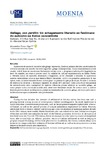Mostrar o rexistro simple do ítem
Gallego, con perdón: Un achegamento literario ao fenómeno do autoodio na Galiza seiscentista
| dc.contributor.author | Peres Vigo, Alexandre | |
| dc.date.accessioned | 2023-11-09T13:16:11Z | |
| dc.date.available | 2023-11-09T13:16:11Z | |
| dc.date.issued | 2023-06 | |
| dc.identifier.citation | Peres Vigo, A., 2023. "Gallego, con perdón;: Un achegamento literario ao fenómeno do autoodio na Galiza seiscentista. Moenia, vol. 28. | es_ES |
| dc.identifier.issn | 2340-003X | |
| dc.identifier.uri | http://hdl.handle.net/2183/34129 | |
| dc.description.abstract | [Resumo] A presenza do autoodio na sociedade galega representa, desde as últimas décadas, un elemento de crecente interese nos estudos de sociolingüística galega contemporánea. A súa transcendencia social resulta visíbel hoxe en numerosos fenómenos sociais como a progresiva substitución lingüística en favor do español, así como o proceso xeral de asimilación cultural experimentada en Galiza. Porén, a reflexión acerca do autoodio, identitario e lingüístico, xa ten chamado a atención de numerosos autores setecentistas entre os que destaca Martín Sarmiento, crítico cos prexuízos antigalegos da súa época, como da interiorización destes en boa parte da poboación galega da altura. Perante a escaseza de testemuños directos, a literatura española do século XVII perfílase como unha fonte documental de extraordinario valor, susceptíbel de explicar diferentes praxes relativas ao autoodio galego, así como propor unha cronoloxía satisfactoria sobre este fenómeno social. Do mesmo xeito, a análise literaria permite situar na diáspora os primeiros testemuños de autoodio galego, así como unha menor incidencia nas capas socialmente máis privilexiadas. | es_ES |
| dc.description.abstract | [Abstract] During the last decades, the presence of self-hatred in Galician society has been met with a growing interest among studies of contemporary Galician sociolinguistics. Its social significance is visible nowadays in several social phenomena, such as the progressive linguistic replacement in favour of Spanish, as well as the general process of cultural assimilation experienced in Galicia. However, self-hatred, both in terms of identity and of language, drew the attention of numerous authors already in the 18th century, most notably Martín Sarmiento, who was critical of the anti-Galician stereotypes of his time and their internalization by much of the Galician population. In the face of the scarcity of first-hand accounts, Spanish 17th century literature emerges as a documentary source of exceptional value, able to shed light on different practices related to Galician self-hatred as well as helping to propose a sound chronology of this social phenomenon. In addition, this literary analysis allows us to locate in the diaspora the first evidences of Galician self-hatred, as well as its occurrence to a certain degree in the more socially privileged strata | es_ES |
| dc.language.iso | eng | es_ES |
| dc.publisher | Universidade de Santiago de Compostela | es_ES |
| dc.relation.uri | https://doi.org/10.15304/moenia.id8433 | es_ES |
| dc.rights | Atribución-Non comercial-Non derivadas 4.0 Internacional | es_ES |
| dc.rights.uri | http://creativecommons.org/licenses/by-nc-nd/3.0/es/ | * |
| dc.subject | Self-hatred | es_ES |
| dc.subject | Galician language | es_ES |
| dc.subject | Spanish literature | es_ES |
| dc.subject | Gallaecophobia | es_ES |
| dc.subject | Sociolinguistics | es_ES |
| dc.subject | 17th century | es_ES |
| dc.title | Gallego, con perdón: Un achegamento literario ao fenómeno do autoodio na Galiza seiscentista | es_ES |
| dc.title.alternative | Galician, If I May Say So: A Literary Approach to the Self-hatred Phenomenon in «Seiscentista» Galicia | es_ES |
| dc.type | info:eu-repo/semantics/article | es_ES |
| dc.rights.access | info:eu-repo/semantics/openAccess | es_ES |
| UDC.journalTitle | Moenia: Revista Lucense de Linguistica & Literatura | es_ES |
| UDC.volume | 28 | es_ES |
Ficheiros no ítem
Este ítem aparece na(s) seguinte(s) colección(s)
-
GI-ILLA - Artigos [112]






